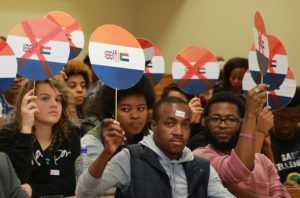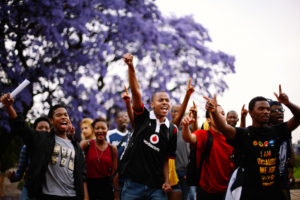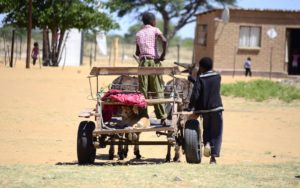Jim McKeown: The low hanging fruit of university funding

PRETORIA, SOUTH AFRICA - OCTOBER 23: Students march to the Union Buildings on October 23, 2015 in Pretoria, South Africa. Chaos broke out at what was supposed to be a peaceful protest outside the Union Buildings by university student from around Gauteng and Limpopo, opposed to tuition fee increases. Police fired rubber bullets to disperse the crowd. (Photo by Gallo Images / Sowetan / Thulani Mbele)
As Fees Must Fall evolved, it was clear that the issues faced by financially needy students are vastly different depending upon (a) their university and (b) whether they are even in university.
All financially disadvantaged students struggle with tuition, but the ‘debt’ vs. ‘access’ debate was muddled. Let’s take Port Elizabeth and the Nelson Mandela Metropolitan University (NMMU) as an example.
At the start of 2016, of the 100 top township learners that applied for NSFAS funding at NMMU, only 18* were offered loans to begin the year. Altogether 10 accepted, as 8 had received bursary offers. It’s worth repeating: Of the 100 top learners from Port Elizabeth township high schools, who represent the very best learners that our township schools are producing, only 18% were offered government loans to continue their studies.
That’s an issue about ‘access’. Contrast that to the leading “fees-related” discussion point from current students about graduating with crippling debt.
In addition to improving ‘access’, the calls for decolonised and free education for the poor (to which the author personally ascribes) drown out some of the calls for smaller structural changes that would make a big difference in the ‘success’ of disadvantaged students in Port Elizabeth.
A few examples of how to increase the success of NSFAS-funded township students at universities:
1. Textbooks: The past two years NSFAS has paid out funds for textbooks in May and June for first year students. As a result, first years are forced to study their first semester in university without textbooks! One obvious solution is better NSFAS administration to ensure funds are released in unison with the school year. Simultaneously, universities should be ‘fronting’ this money to campus bookstores for NSFAS-approved students until NSFAS funds are released, thus reimbursing the ‘fronted’ money.
2. Transportation Fees: NSFAS students that live within 25 km of campus are not allowed to apply for housing loans. As a result, they live one hour and two taxi rides from campus. Once again, if NSFAS is paying out in May and June, how are these students expected to get to campus? In addition to identical solutions to the textbook issue, universities should be providing free shuttles to major taxi ranks in our local townships. We note that NMMU provides free shuttles between campuses and to students living throughout the local off-campus residences in Summerstrand (walking distance to campus). Those shuttles should exist, however if funding for shuttles is available, why not prioritise transporting the poor?
3. Nutrition: NMMU students from the PE townships on NSFAS loans receive R750 per month for food and transport. The double taxi route costs R40 per day, which equates to R800 per month. Research regarding nutrition and concentration is clear. It would be an investment that pays for itself.
4. Housing: Students living in the local townships are completely isolated from campus. A big part of university life takes place outside of the classroom: Learning to live independently; living with people from different cultures; attending university events (often held in the evenings). Not to mention the challenges of living in an impoverished, often crowded, home environment.
There is a lot of other lower hanging fruit. Some suggest laptops are a necessity today, especially for off-campus learners who struggle to get access to under-resourced computer labs during school hours. Others note that bursar funding is often misallocated, despite good intentions, to cover tuition and books only. Perhaps it’d be better to have a student keep their NSFAS tuition loan and use that bursary money to buy a student’s laptop and sponsor housing.
The bottom line is that we need a young, educated, and empowered generation to rise up from our townships. A generation to become the future leaders that will return to those townships to uplift their families, solves their communities’ problems, and serve as roles models to their youth.
A little extra investment in these students’ success will ensure not only that they are able to repay their student loans (and thus keep NSFAS solvent), but that they are able to uplift their own families and communities in the future.
A giant leap to free education would be fantastic. But you know what else would be? A few practical, and very affordable steps such as those listed above.
* After intensive efforts an additional 38 high school learners received NSFAS funding in August 2016. Read more about Masinyusane’s work here.







I am glad someone is thinking out of the box. Thanks for assisitng those students, can you please look at places like Uitenhage and Despatch?
Excellent piece, Jim! Superb, no-brainer suggestions.
It is highly appreciated that there are people who actually care about the wellbeing of others, especially the poor as the Soth African system of higher education fails to accomodate such people, allow me to quote the words that were once aptly spoken by the Greek philosopher, Aristotle and read as follows;
“All who have meditated on the art of governing mankind have been convinced that the fate of empires depends on the education of the youth.”
As one of the students who receive assistance from Masinsyusane, I feel obliged on behalf of those who feel the same way, to thank you bhut Jim, for your commitment to make heard the voice of those who cannot speak for themselves. as one spiritual leader puts it
“The two words that can change a person’s life forever, but are often taken for granted by many, and those words are ‘Thank you.'”
The middle class fight